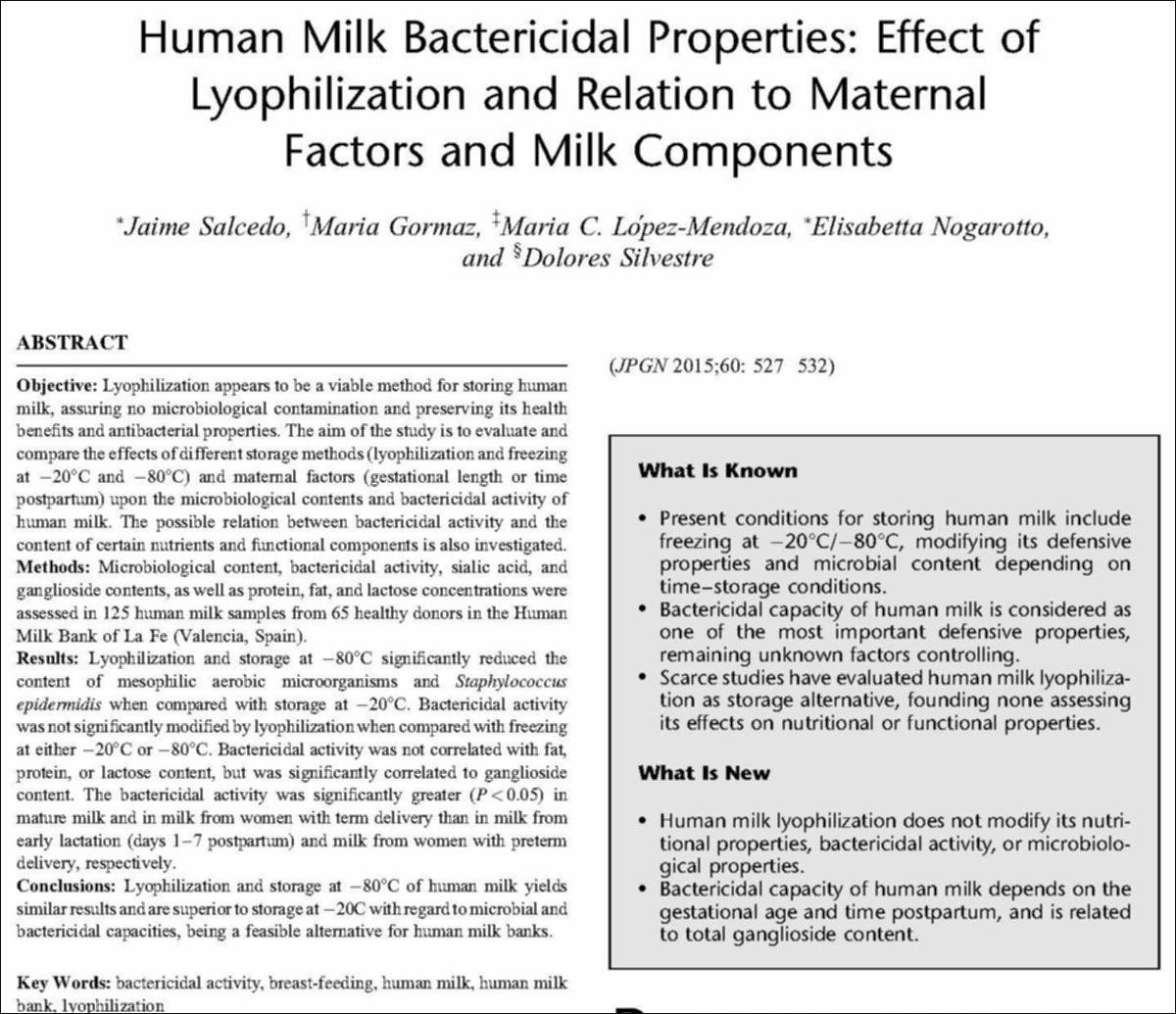Por favor, use este identificador para citar o enlazar este ítem:
http://hdl.handle.net/10637/16285Human milk bactericidal properties : effect of lyophilization and relation to maternal factors and milk components

Ver/Abrir:
Human_Salcedo_JPGN_2015.jpg
545,82 kB
JPEG
Ver/Abrir:
Human_Salcedo_JPGN_2015.pdf
Acceso restringido
173,99 kB
Adobe PDF
Request a copy
| Título : | Human milk bactericidal properties : effect of lyophilization and relation to maternal factors and milk components |
| Autor : | Salcedo, Jaime Gormaz, María López Mendoza, María Carmen Nogarotto, Elisabetta Silvestre Castelló, Dolores |
| Materias: | Leche materna; Mother's milk; Lactancia materna; Breast feeding; Liofilización; Freeze-drying |
| Editorial : | John Wiley & Sons |
| Citación : | Salcedo, J., Gormaz, M., López-Mendoza, M.C., Nogarotto, E., & Silvestre, D. (2015). Human milk bactericidal properties : effect of lyophilization and relation to maternal factors and milk components. Journal of Pediatric Gastroenterology and Nutrition, 60(4), 527–532. https://doi.org/10.1097/MPG.0000000000000641 |
| Resumen : | Objective: Lyophilization appears to be a viable method for storing human milk, assuring no microbiological contamination and preserving its health benefits and antibacterial properties. The aim of the study is to evaluate and compare the effects of different storage methods (lyophilization and freezing at −20°C and −80°C) and maternal factors (gestational length or time postpartum) upon the microbiological contents and bactericidal activity of human milk. The possible relation between bactericidal activity and the content of certain nutrients and functional components is also investigated. Methods: Microbiological content, bactericidal activity, sialic acid, and ganglioside contents, as well as protein, fat, and lactose concentrations were assessed in 125 human milk samples from 65 healthy donors in the Human Milk Bank of La Fe (Valencia, Spain). Results: Lyophilization and storage at −80°C significantly reduced the content of mesophilic aerobic microorganisms and Staphylococcus epidermidis when compared with storage at −20°C. Bactericidal activity was not significantly modified by lyophilization when compared with freezing at either −20°C or −80°C. Bactericidal activity was not correlated with fat, protein, or lactose content, but was significantly correlated to ganglioside content. The bactericidal activity was significantly greater (P < 0.05) in mature milk and in milk from women with term delivery than in milk from early lactation (days 1–7 postpartum) and milk from women with preterm delivery, respectively. Conclusions: Lyophilization and storage at −80°C of human milk yields similar results and are superior to storage at −20C with regard to microbial and bactericidal capacities, being a feasible alternative for human milk banks. |
| Descripción : | Este recurso no está disponible en acceso abierto por política de la editorial. |
| URI : | http://hdl.handle.net/10637/16285 |
| Derechos: | http://creativecommons.org/licenses/by-nc-nd/4.0/deed.es |
| ISSN : | 0277-2116 1536-4801 (Electrónico) |
| Fecha de publicación : | abr-2015 |
| Centro : | Universidad Cardenal Herrera-CEU |
| Aparece en las colecciones: | Dpto. Producción y Sanidad Animal, Salud Pública Veterinaria y Ciencia y Tecnología de los Alimentos |
Los ítems de DSpace están protegidos por copyright, con todos los derechos reservados, a menos que se indique lo contrario.

